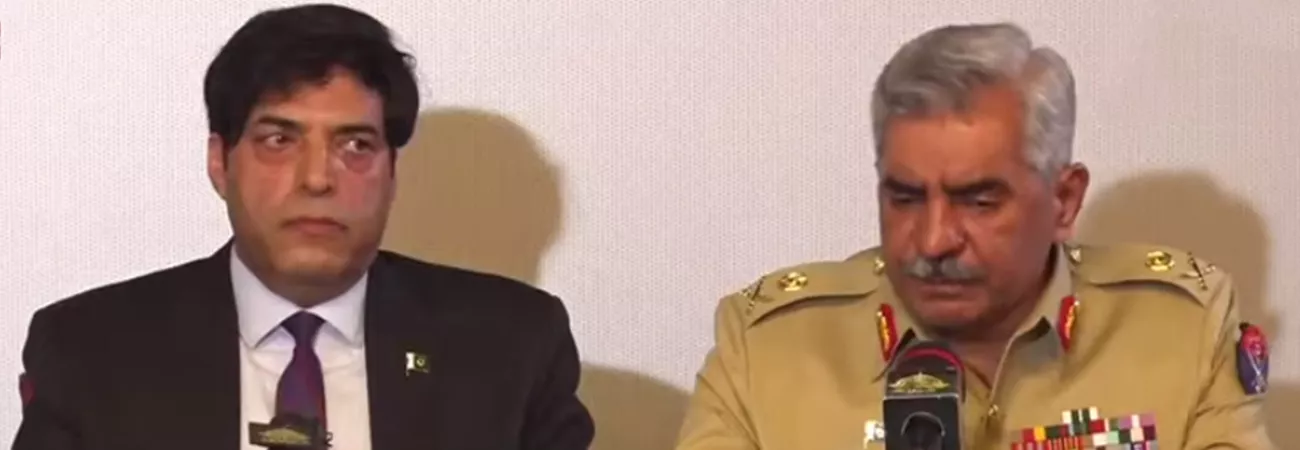i NEWS PAKISTAN
Inter-Services Intelligence (ISI) Director General Lt-General Nadeem Anjum has revealed that Army Chief General Qamar Javed Bajwa was offered life-long extension in service in March this year but he declined it. "This happened when the no-confidence motion against the then government was at its peak," he recalled.
Addressing a rare but explosive joint press conference with ISPR Director General Lt-General Babar Iftikhar in Rawalpindi on Thursday, the ISI chief disclosed: “I am eyewitness to the life-long offer as it was made in my presence but the army chief rejected it on the spot.”
The ISI chief said he knew that journalists were surprised to see him in their midst but remaining silent at a time when chaos and anarchy was feared in the country was not good.
He said his policy was clear that he did not want any publicity. He expressed the resolve to continue to defend his institution and martyrs of the country’s armed forces.
He went on to say that in March 2022, Army Chief General Qamar Javed Bajwa had been offered extension for an indefinite time period.
The ISI DG said it was unfortunate that the ‘martyrs’ of the armed forces were ridiculed. He said despite intense pressure, the ISI performed its constitutional duty.
Lt-General Nadeem Anjum regretted that a false propaganda had been unleashed against the defenders of the country with so much ease. “The tendency to call Pakistan Army’s high command ‘Mir Jaafar’ and ‘Mir Sadiq’ should be discouraged,” he said, and questioned the PTI as to why it had given extension to the army chief, why it had offered unlimited extension to the army chief when it was in power in March. “They even now meeting the army chief at night behind the doors. Why they are seeking such meetings at night and hurling accusations in the day,” he questioned.
The chief of the country’s premier intelligence agency further said that there was no threat to the life of late journalist Arshad Sharif in Pakistan. Taking the investigation into Arshad's murder to its logical conclusion has become imperative otherwise the 'damage' would be huge, he added. He informed that he was in touch with his Kenyan counterpart.
The ISI director general said that a cent percent transparent inquiry will be conducted into the Arshad Sharif’s murder and all the findings will be shared with the public through ISPR.
Talking about the officers martyred in Lasbela, he said that they were mocked. Therefore, it is highly condemnable to speak without proof, he said, adding words like “neutral and janwar” were meant to illustrate that the institution was indulging in sedition. He added these words were also being used because the institution refused to bend to an “unconstitutional and illegal act”.
He said that in March, there was “a lot of pressure” but the institution and the army chief decided to limit the military to its constitutional role.
If Gen Bajwa wanted, he could have spent the last few months of his tenure comfortably but he sacrificed in the country’s best interest, he said, adding the army chief’s family was also targeted.
Later in response to a question about who offered the extension to the COAS, he said that it was “evident” that it was the government in power at the time. “The offer was made because the no-confidence motion was at its peak,” he said.
The ISI chief said the politics of hate and division was a threat to Pakistan.
He made it clear that staying away from politics was not only Gen Bajwa’s decision, but of the entire institution of the Pakistan Army.
“There is a risk of instability in Pakistan,” ISI DG said. “You are free to criticize and hold the armed forces of Pakistan accountable. But please do not level allegations at us,” he appealed to the people.
Lt Gen Nadeem Anjum said that the establishment would not let anybody create instability in the country. “And if called by the government to control the situation during the long march, Pakistan Army personnel will be out there on the roads,” he stated categorically.
Admitting that the right to protest was every citizen’s fundamental right, DG ISPR said he did not think there was any risk to the government if any party marched on it.
ISPR Director General Lt-General Babar Iftikhar has said that the Arshad Sharif’s killing was a tragedy as he was an icon of journalism in Pakistan.
While addressing the press conference, the military spokesman said that it was necessary to unearth the facts related to the death of Arshad Sharif because baseless allegations were made against the institutions, its leadership and the Army Chief.
At the outset of his press conference, Babar Iftikhar said the purpose of today's media talk was to shed light on the killing of journalist Arshad Sharif in Kenya and the circumstances surrounding it.
This press conference is being held in the context of presenting facts so that "facts, fiction and opinion can be differentiated", Babar Iftikhar said, adding that Prime Minister Shehbaz Sharif had been "specially informed" about the sensitivity of the new conference.
Besides, it was imperative to determine the factors due to which a particular narrative was being built and people were being misled, he said, adding "The chief of army staff was also targeted and faced criticism. An attempt was made to create a split in the society."
The ISPR chief said that Arshad Sharif's death was an "unfortunate incident" and called him an "icon of journalism in Pakistan". He noted that members of the late journalist's family had served in the Army, adding that he always felt the pain of martyred officers.
Lt-Gen Iftikhar went on to say that Arshad Sharif's popularity was based on being an investigative journalist and when the cypher — which PTI chief Imran Khan has touted as evidence of a foreign conspiracy to oust his government — surfaced, he conducted several programmes on the issue.
He held several meetings with the former premier and interviewed him, the DG ISPR said. "As a result, it was stated that he was shown meeting minutes and the cypher," he added.
The facts behind the cypher and the journalist's death have to be determined, he said.
Talking about the cypher, Gen Iftikhar said that the army chief had discussed it with Imran on March 11 when the latter had termed it to be "not a big thing". "It was surprising for us when on March 27 a piece of paper was waved and an attempt was made to build a narrative that was far from reality," he further recalled.
He said that several facts had come to light regarding the cypher revealing the "baseless and unfounded" narrative surrounding it.
The Army informed the National Security Committee that no proof was found regarding the conspiracy against the PTI government, he said, adding that the Inter-Services Intelligence (ISI) also did not find any evidence regarding the conspiracy.
"This is all part of the record. We wanted to bring this to the public. And we left the decision to the then government," Babar Iftikhar said, adding, however, this did not happen and more rumours were spread to score political mileage, and the Army was also targeted.
The ISPR DG said then Arshad Sharif and other journalists were fed a particular narrative and an attempt was made to defame Pakistan and the country's institutions across the world. "In this media trial, ARY News TV channel played the role of a spin doctor in targeting the Army and promoting a false narrative. The NSC meeting was highlighted in the wrong context," he revealed.
Gen Iftikhar stated that the Army was expected to intervene in domestic politics. "The word neutral and apolitical was turned into an abuse. To all these baseless accusations, the Army Chief and the institution showed restraint and we tried our level best that politicians sit together to resolve their issues on their own," he further elaborated.
The ISPR chief noted that Arshad Sharif made strong comments regarding the Army during this time but added that "we did not have any negative sentiments about him and we don't have such feelings now".
He accused the PTI of using the view point of Pakistan’s ambassador in the USA for political purposes.
Lt-General Babar Iftikhar also revealed that the Khyber Pakhtunkhwa government on August 5 had issued a threat letter on the directives of Chief Minister Mahmood Khan which stated that a Tehreek-i-Taliban Pakistan (TTP) splinter group may target Arshad Sharif. "In this regard, no info was shared with the institutions who provided them the information."
This shows the threat alert was issued with the aim to force Arshad Sharif to leave the country, Gen Iftikhar said. "There was reports that he (Arshad Sharif) did not want to leave the country but he kept being reminded that he was facing a threat to his life,” he said.
He went on to say that on August 8, Shahbaz Gill’s statement on ARY News regarding the country’s institutions was condemned and the politician was arrested a day later.
He said that when ARY News head Ammad Yousuf, who was arrested in August, it emerged that ARY CEO Salman Iqbal had asked the former to send Arshad Sharif abroad as soon as possible.
The DG ISPR stated that a manager in the ARY Group booked a ticket for Sharif for Dubai costing Rs550,000, according to which he was supposed to be back on September 9. “On August 10, he left Peshawar airport thorough PK-637 for Dubai. He was provided complete protocol by the KP government,” he said, adding that the late journalist was escorted by KP officers to the airport.
“Arshad remained in the UAE until he had a valid visa. He left for Kenya when his visa for Dubai expired,” he further said.
He said that no one “forced” Arshad Sharif to leave Dubai at a government level and questioned who exactly forced him to leave. He also questioned who processed the journalist’s documents in the UAE, who looked after his accommodation, who forced him to not return to Pakistan and who assured him that he was safe in Kenya.
He also questioned who was in contact with Arshad Sharif from Pakistan and who was hosting him in Kenya. “Kenyan police accepted their mistake and it has to be examined whether this is a case of mistaken identity or one of targeted killing. There are several questions that have to be answered,” he said, calling for a “transparent and fair probe”.
Therefore, the government has been requested to form a high-level inquiry commission, he said.
Responding to a question about PTI leader Faisal Vawda’s yesterday’s press conference, Lt General Babar Iftikhar said those were his personal views.
The ISPR chief said they were not going to comment on the statement of Faisal Vawda. "No word on Faisal Vawda. The statement was his own views," he added.
The ISPR chief also confirmed the meetings between the president and the army chief during the recent past.
He said the appointment of new army chief will take place on time and in accordance with the constitution.
He warned that the military will not let anyone destabilise the country. "No political or economic stability will be allowed," he added.
Accusation that ‘establishment’ wanted Arshad to stay in Pakistan rejected
Coming back to the topic of late Arshad Sharif, ISI DG said if the ‘establishment’ wanted to stop him from going abroad, it could have done it easily.
The question, he added, was that who had sent Arshad to Kenya, and who was bearing his expenses?
He rejected the allegation that any government official had approached the authorities in Dubai to expel the slain journalist. “Arshad was repeatedly told that his life was in danger in Pakistan,” Lt Gen Nadeem Anjum opined that several questions related to the journalist’s murder were still unanswered.
The DG ISPR went on to say that the name of the ARY CEO was surfacing again and again. “He should be brought back to Pakistan and made part of the probe,” he urged, saying after Arshad Sharif’s death, people had started pointing fingers at the army. “It has to be determined who exactly benefitted from his killing,” he maintained.
“It’s your responsibility now to unearth the facts and bring them to light. We have to wait for the report from the inquiry commission. Until the report is released, it is not appropriate to make allegations,” he advised, saying “No one wants to be labelled a traitor after serving for 30-40 years. We can be weak, we can make mistakes, but we can never be a traitor or conspirator. The army is nothing sans the people,” he said.
The ISI chief said “Pakistan is a democratic country and deciding who are friends and foes is the job of the democratically elected government. The institution’s role is to present their analysis on the basis of their information. The decision will be the government’s.”
The ISI chief said that when he was appointed, he was asked about the country’s main issue. “I said it was our economic woes, but those who asked the question did not agree. In their view, the opposition was the biggest problem.”
He said that political intolerance causes instability, and constitutional and legal ways needed to be pursued. “When we go through the back door, it causes anarchy in the country,” he opined.
Responding to a question, the ISI chief said he was not here for personal reasons. “There were campaigns against me in March on social media. I got a call from the agency that a campaign was underway against me. I told them get in touch when the retweets exceed 8,000 million. Before that, I don’t care about myself,” he recalled.
Credit : Independent News Pakistan-INP









